26 y/old || genderqueer stone butch lesbian, they/them || chivalry's not dead, they're a delusional butch trying to build the dyke library of alexandria || BLOG DESIGN IN PROGRESS BUTTONS DON'T WORK YET (6/3/24)
Don't wanna be here? Send us removal request.
Note
Wow, thank you so so much! Folks, hats off to @dykeologian for lo, they have provided.
Hi, I am looking for a lesbian magazine called Siren. It ran from 1995 to 2004. Do you happen to know about it and know where we can find it online? I'd be very grateful for your help please!
Hello, and thank you for your ask. First, my apologies for excessive delay.
Second, while I have yet to lay hands on a copy of any of the Siren periodicals myself, I have heard of it ... a cursory search of Worldcat shows that there are a few libraries in the USA (University of Wisconsin in Madison, WI, the Ohio State Library in Columbus, OH, and the Cornell University Library in Ithaca, NY) that may have copies of that magazine in their archives. Otherwise, it appears there are a number of Canadian libraries that have copies. See the details here. A Yale University guide from 2005 also claims to have a few of the magazines (See here.)
Worldcat is a pretty good resource, but of course it often doesn't capture the potential catalogue of every archive out there. If you are looking for in-person copies, I'd recommend studying a map of your area to see what colleges and libraries that might conveniently be in your area, and then perusing the internet for any associated websites these libraries and colleges might have. With any luck, they may have an online record listing their current archival contents. Any library or archive with a dedicated LGBT+ section might show promise ... and you can always ask that same archive if they know of any other archive with copies, if they themselves lack copies of the Siren magazine. (I would go for college archives first, personally.)
Going off wild guess, I would assume that within the USA, the best chances of finding a physical copy might lie with archives relatively close to Toronto, Canada, as that was where the magazine was originally published. State-wise, Toronto's closest neighbors are Wisconsin, Michigan, Ohio, Pennsylvania, and New York. I wouldn't be surprised if Chicago, Illinois has something ... I love the libraries over there, quite extensive.
As for online copies of Siren, I haven't run across an issue yet. If this changes, I'll report my findings with a reply to this same ask.
#i would be so intrigued as to how you found this or knew about this#is this a collection of files passed from one interested party to the next on the internet#or did you photocopy a primary source?#questions for the archivist#someone else answers#siren magazine#offerings from the archive#this^ will be my tag for offered content i think
401 notes
·
View notes
Note
Hi, I am looking for a lesbian magazine called Siren. It ran from 1995 to 2004. Do you happen to know about it and know where we can find it online? I'd be very grateful for your help please!
Hello, and thank you for your ask. First, my apologies for excessive delay.
Second, while I have yet to lay hands on a copy of any of the Siren periodicals myself, I have heard of it ... a cursory search of Worldcat shows that there are a few libraries in the USA (University of Wisconsin in Madison, WI, the Ohio State Library in Columbus, OH, and the Cornell University Library in Ithaca, NY) that may have copies of that magazine in their archives. Otherwise, it appears there are a number of Canadian libraries that have copies. See the details here. A Yale University guide from 2005 also claims to have a few of the magazines (See here.)
Worldcat is a pretty good resource, but of course it often doesn't capture the potential catalogue of every archive out there. If you are looking for in-person copies, I'd recommend studying a map of your area to see what colleges and libraries that might conveniently be in your area, and then perusing the internet for any associated websites these libraries and colleges might have. With any luck, they may have an online record listing their current archival contents. Any library or archive with a dedicated LGBT+ section might show promise ... and you can always ask that same archive if they know of any other archive with copies, if they themselves lack copies of the Siren magazine. (I would go for college archives first, personally.)
Going off wild guess, I would assume that within the USA, the best chances of finding a physical copy might lie with archives relatively close to Toronto, Canada, as that was where the magazine was originally published. State-wise, Toronto's closest neighbors are Wisconsin, Michigan, Ohio, Pennsylvania, and New York. I wouldn't be surprised if Chicago, Illinois has something ... I love the libraries over there, quite extensive.
As for online copies of Siren, I haven't run across an issue yet. If this changes, I'll report my findings with a reply to this same ask.
#thatbutcharchivist#questions for the archivist#the archivist answers#siren magazine#lesbian magazine#canadian lesbian magazine#thank you for your ask!#and for everyone else who sent in an ask that i have yet to answer#you have not been forgotten#though i understand of course if given the time it's taken me to reply this may seem absurd
401 notes
·
View notes
Text
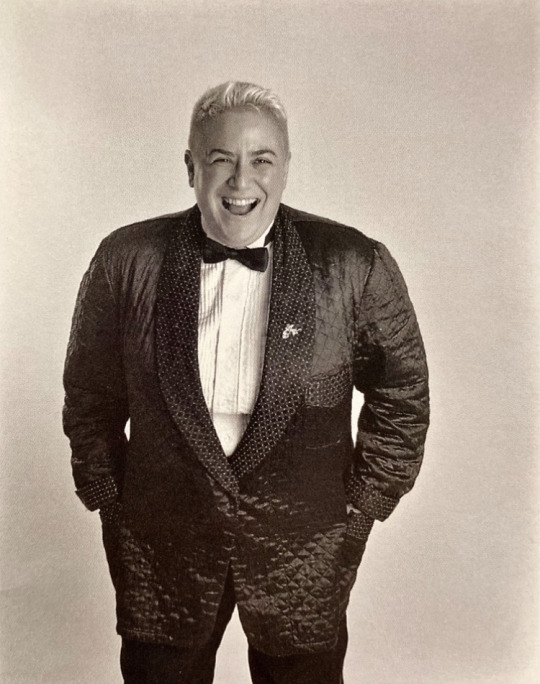
"Fairy Butch"
source: Girls' Night Out, photographed by Chloe Atkins
539 notes
·
View notes
Text

"Jenna"
source: Girls' Night Out, photographed by Chloe Atkins
492 notes
·
View notes
Text

"Elvis Herselvis"
source: Girls' Night Out, photographed by Chloe Atkins
788 notes
·
View notes
Text

"Lisa"
source: Girls' Night Out, photographed by Chloe Atkins
447 notes
·
View notes
Text
"I am grappling to find a way to write the introduction to this book, a book I agreed to do with Tristan Taormino nine months ago. Mostly, I am struggling to find any words at all. Sitting at my computer in downtown New York City, I smell smoke and ash. I listen to ongoing, endless reports about the attacks on the World Trade Center Towers and the aftermath of this crisis. I am trying to write about desire while in a state of shock and grief, fear and confusion. For me, right now, it is hard to think about anything else. As I sit here wondering how I can possibly write about sex and desire today, the thought comes to me that maybe, just maybe that is the whole fucking point. For a long time I have written about sex, cared about desire, fought to have the erotic understood for its significance and importance in human experience. I have fought especially to have our queer desires--our lesbian and gay, bisexual, transgendered, intersexed, two-spirited desires--understood. And to have our communities respected for the fact that, as queer people, we often bring a deep and unique understanding to the importance of desire, because we have had to fight so hard for the right to feel and express it. [...] In the midst of this, I have lived as a high-femme lesbian, wanting, desiring, and loving a beautiful range of passionate gender rebels--living through the power of my own femme identity and the authority of that desire [...] I have had to fight for that particular set of desires every day inside myself, as well as in the outside world. In the left, in the feminist movement, and in many progressive movements, the political work of fighting for the integrity and importance of sex is generally not a priority. And ironically, in many parts of the queer movements themselves, sex is now a subject we are encouraged to speak of with restraint [...] so that the tiny political space we have carved out for ourselves over the last twenty-five years of struggle won't be taken away. We don't dare insist on valuing and articulating desire as part of what we fight for [...] With all that has just happened here in New York City in a single day, these stories are a reminder to reach out and feel my lover's kiss as it shapes itself over my mouth, to dare to feel the fear and pleasure of anticipation [...] For myself, at this moment, it is critical that I remember the beauty of going under, of risking this dangerous desire, when inside my body all I am conscious of is numbness and grief and fear. I need to remember pleasure in the face of sorrow. [...] It is brave to insist on pleasure as a right, rather than a privilege reserved for other people. And as these stories suggest, to queer that desire is to engage [...] with the power and mystery of how and why we want each other, and then how we make it concrete and alive. [...] Take this book for what it is and what I hope you find here--a hope, a promise, a comedy, a climax, a wish for desire in the face of a threatening and imperfect world. Drink this joy hungrily. [...] In the midst of that danger, and all the others that cluster around us, remember the power and beauty of our queer desires. We live in a time of unknown consequences, in a brokenhearted world, a world whose future we don't know until we face it."
-- Excerpted from Amber Hollibaugh's "Terror and Desire," an introduction for the book Best Lesbian Erotica 2002. (Emphasis in bold my own.)
Year of publication: (September) 2001
#thatbutcharchivist#archived#lesbian#lesbian literature#lesbian essay#femme#femme lesbian#high femme#high femme lesbian#author: amber hollibaugh#author: tristan taormino#year: 2001#decade: 2000s#publisher: cleis press#best lesbian erotica 2002#terror and desire#hollibaugh is a really brilliant writer and i'm still not over her death tbh
71 notes
·
View notes
Text
"I have a thin stack of photographs from my fiftieth birthday party. This morning I've drawn them from a crumpled white envelope to look at them for the first time since that evening. I've delayed looking--the weight the pictures carry is heavy. That night there were flowers, candles, jazz, blues, and salsa, party favors that uncurled like snakes, and a huge sugary cake. My two beautiful grown sons and I and my beloved Leslie gathered with friends in an echoing room. There I usually sat at long tables in political meetings, shoulder to shoulder with others, listening, talking, our hands busy stuffing envelopes for our next demonstration. But that night the room was transformed with balloons, streamers, banners--and photographs everywhere. Leslie had set up tall cardboard stands with pictures documenting my "fifty years of love and struggle." At the center were pictures of me and my sons. [...] Them at seven and eight, sitting knee to knee on top of my VW bug--I am standing by the open car door, one hand turning nervously against the other. I'm about to drive the children back to their father, who wrested custody of them from me. He has had me declared an unfit mother, because I am a lesbian. In all the pictures of us together we are smiling. There are no snapshots of the moments of terrible pain--the images that flash through memory over and over, like a home movie of agony. [...] Perhaps every family album has these private pictures, the stories we try to guess at from a few hidden whispers and the grief-struck eyes above someone's smiling mouth. [...] This is the family album of one of the many of us who have been told that we are not fit to have a family, told that we can stay in the family only if we are quiet and invisible, told not to "flaunt" our life, not to make a scene. [...] One June day, in his teenage years, my oldest called to talk about a video he'd just seen on public television, a documentary about gay families. I said to him, "You know, I've never asked how you've felt about my being a lesbian, how you think it's affected you." And he said, "Your being a lesbian didn't affect me. What hurt me was not being able to have you with me." My story is but one of many, that of a woman who mothered her children almost in isolation for years. Who struggled to hold them as a family even though the law decreed that they could not enter her home if she shared it with another adult. Who strove to teach them connection to the forbidden others in her life, those who might give them a new kind of family, a different kind of world, where no people would lose their family because of hatred against how they love or the color of their skin, because of their despised femaleness or their poverty. [...] I unfold the creased envelope. The pictures from that birthday night show the four of us standing awkwardly together. One son smiles but looks down; the other frowns, turned inward. My smile is tense, Leslie's face is drawn and tired from a recent illness. Yet beyond that snapshot are moments when we are smiling. The four of us piling into a car later that night, crammed in with presents, cards, chrysanthemums, and cake, laughing giddily that we are like a clown car in the circus, like a party ready to burst out when a door opens, everything in hand that we need for another feast. [...] We have fought to claim our lives with each other despite years that we have been physically, forcibly, separated. Despite years of no words to explain to others what we are to each other. How--despite what law, custom, religion may say--we are heart of each others' hearts."
-- Excerpted from "Family Album," Minnie Bruce Pratt's foreword for Love Makes A Family: Portraits of Lesbian, Gay, Bisexual, and Transgender Parents and Their Families. (Emphasis in bold my own.)
Year of publication: 1999
#thatbutcharchivist#lesbian#lesbian literature#author: minnie bruce pratt#author: peggy gillespie#photographer: gigi kaeser#year: 1999#decade: 1990s#archived#this is a very good photobook i'm a little unsure how to tag it hmmm#lesbian essay#publisher: university of massachusetts press#family album#love makes a family#love makes a family: portraits of lesbian gay bisexual and transgender parents and their families
122 notes
·
View notes
Text
"LAS: That's the thing about being femme: you don't enjoy everything about being a girl. AH: That's right. You're always trying to figure out what part of female experience you're going to appropriate, and what part of it puts you in a compromised position. So you are constantly in an internal struggle: does this hairdo, this dress, this mannerism, this way of sitting, speaking, this eyeliner in any way compromise my femme position? Femme identity is as constructed as butch identity and not a lot of people talk about it like that. LAS: Can you talk more about that? AH: The difference between myself and many of the straight women that I know is that they think they are normal and natural. They believe in girl-ness, that girl-ness becomes woman-ness, and woman-ness becomes old-woman-ness. They believe in a gendered system that they flow through ... But my role models for being femme have been drag queens, because drag queens construct female identity. I look at drag queens and think, That's how I feel as a woman ... LAS: Drag queens and femmes both have that blatancy, that in-your-face outrageousness, and sense of being too much. AH: My femininity is about irony. It is a statement about the construction of gender; it is not just an appropriation of gender. It is not being a girl; it is watching yourself be a girl. I go to drag queens as my mentors and my role models because they were the ones who believed completely and passionately in their femaleness. The better they were as drag queens, the more they were completely 120 percent girl when they were in persona. They knew exactly the work it took to get there ... They could take the dress off and be the messiest looking guy in a coffee shop, but in twenty-five minutes could be the most ravishing beauty. They made femininity make sense to me."
-- An excerpt from "Gender Warriors: An Interview with Amber Hollibaugh," as recorded in Fem(me): Feminists, Lesbians, and Bad Girls and conducted by Leah Lilith Albrecht-Samarasinha. (Emphasis in bold my own.)
Year of publication: 1997
#thatbutcharchivist#lesbian#lesbian literature#archived#femme#femme lesbian#femme dyke#gender warriors: an interview with amber hollibaugh#author: leah lilith albrecht-samarasinha#author: amber hollibaugh#author: elizabeth crocker#author: laura harris#femme: feminists lesbians and bad girls#lesbian books#year: 1997#decade: 1990s#publisher: routledge#lesbianism#amber hollibaugh
984 notes
·
View notes
Text
"Q: Finally, putting this all together, what does femme mean to you? MBP: Femme means to me that I have a feminine gender expression as a site of resistance of old values. Those values say that I am not a fighter, I am not smart, I am not tough, or that I can't be sexual and be a mother too. There are a lot of these should-nots attached to the old way of being femme that I have cast aside. In making my life a site of resistance, I walk through life my own way and create a kind of power and defiance that says "You can't touch me unless I say yes." To me, femme means being powerful in myself, in my own body, with all her feminine ways. It means saying to myself I don't have to take care of other people or give myself up for somebody else. Femme means that I am conscious about what people are saying and doing around me, toward me, as a woman, and that I always maintain my dignity and power. [...] I do not think that femme means making your butch take the trash out for you. I do not think that femme means loving to shop. If loving to shop for clothes was femme, Leslie would be a femme. I don't think femme is having long fingernails. I don't think femme is not understanding how to deal with money. Those are old degrading stereotypes that establish femme on a foundation that is degrading to women. And I do not agree with that at all. For me, femme is a place of resistance to that degradation, a place to divest femininity of limiting stereotypes, and a place to assert the power and dignity of femaleness."
-- An excerpt from "Pronouns, Politics, and Femme Practice: An Interview with Minnie Bruce Pratt," as recorded in Fem(me): Feminists, Lesbians, and Bad Girls. Questions developed by Laura Harris and Elizabeth Crocker, the interview conducted by Tania Hammidi. (Emphasis in bold is my own.)
Year of publication: 1997
#thatbutcharchivist#archived#lesbian#lesbian literature#femme: feminists lesbians and bad girls#pronouns politics and femme practice: an interview with minnie bruce pratt#pronouns politics and femme practice#year: 1997#decade: 1990s#publisher: routledge#author: laura harris#author: elizabeth crocker#author: minnie bruce pratt#minnie bruce pratt#author: tania hammidi#femme#femme lesbian#femme dyke#queer femme#the leslie mentioned here is indeed leslie feinberg#at the time of this interview leslie feinberg and minnie bruce pratt had been together only 3 years#this is mentioned in the intro to the interview
335 notes
·
View notes
Note
hey babe!! love ur work so much, just wondering, is your google drive collection public, or is it private? if its public, where could i find it? totally understand if its private lol i cant imagine how much work has gone into it
from a femme looking to read <3
Hey, thank you for your ask! Currently the Google Drive collection is private, but that's only because it's still in-progress and still being sorted out. The goal is for it to be public and accessible to others once it is more or less put-together.
Of note, there are some books that I have that need to be digitally catalogued as they do not appear to exist out in the wide world of the internet yet, and I was delayed for a while in working on that as my old scanner decided to take a trip to the electronic afterlife. I'm also still in the process of carefully splitting up PDFs of books and separating their individual essays into categories for easier reading (i.e. I'm trying to categorize materials such that instead of having to go through an entire book to find the 1-2 essays about femme-ness or, say, Chicana lesbians, you could simply pull up the folder that contains all the known essays about those topics and browse for materials that way instead.)
I thank you for your interest, and will contact you when the GDrive is up and available for your perusal.
27 notes
·
View notes
Text
"Assimilationist politics have a long history, are now gaining strength, and will not vanish if ignored; these are the people about whom the movies are made, and the ones who own the glossy gay magazines. Because these folks have the dollars and can get over, they are the ones who set political agendas that will decide the very boundaries of how we are allowed to live. The struggle for liberation must include the liberty to express identity in a great variety of ways. Those of us perceived as acceptable by an assimilationist politic must constantly show our alliance to people marked as stereotypical."
-- An excerpt from "How Does She Look?", an essay written by Rebecca Ann Rugg and found in Fem(me): Feminists, Lesbians, and Bad Girls. (Emphasis in bold my own.)
Year of publication: 1997
#author: rebecca ann rugg#author: laura harris#author: elizabeth crocker#femme: feminists lesbians and bad girls#essay#lesbian essay#year: 1997#decade: 1990s#publisher: routledge#archived#thatbutcharchivist#lesbian literature#lesbian books#lesbian
87 notes
·
View notes
Text
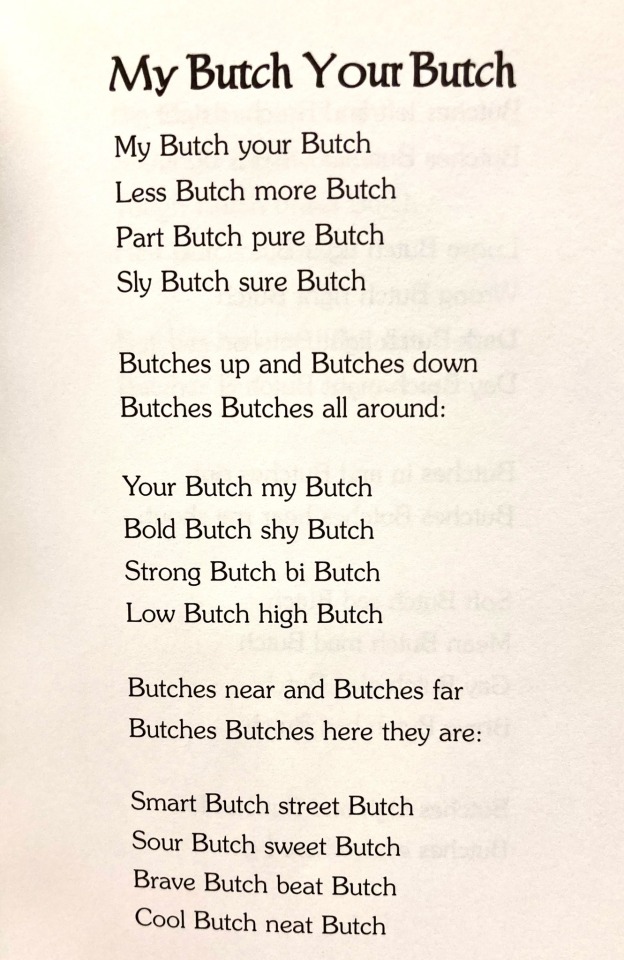


source: The Little Butch Book by Lesléa Newman
320 notes
·
View notes
Text
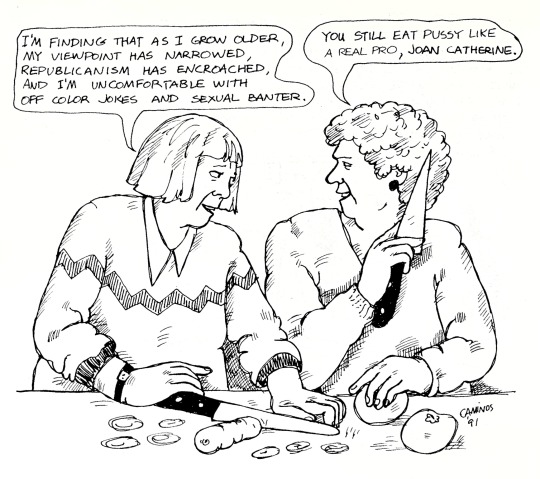
source: That's Ms. Bulldyke to You, Charlie! by Jane Caminos
#the archivist reblogs#lesbian comics#you still eat pussy like a real pro joan catherine#still hits hard
468 notes
·
View notes
Text
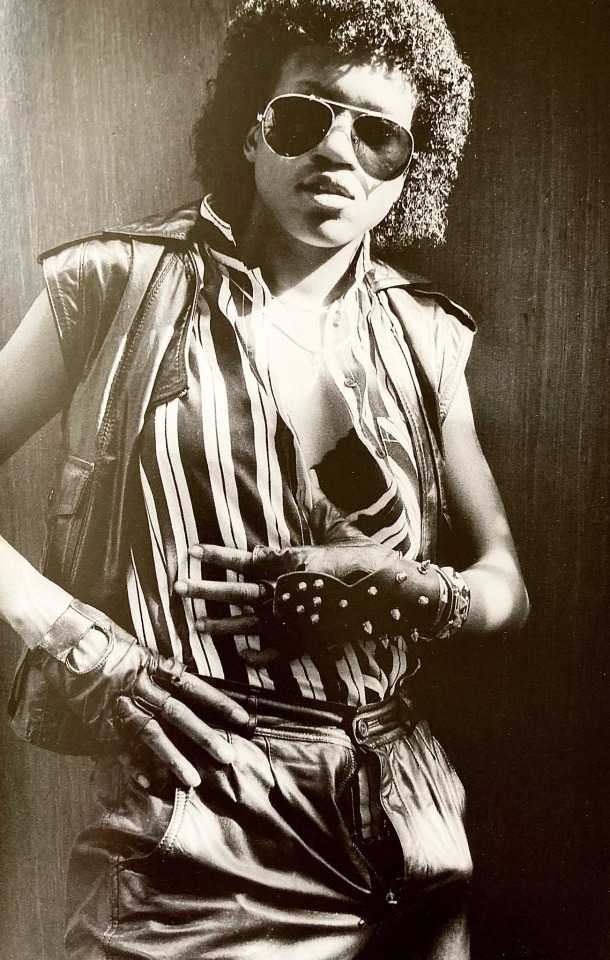
"Fire" by Jennie Sullivan, 1988
source: Nothing But the Girl: The Blatant Lesbian Image, edited by Susie Bright and Jill Posener
#the archivist reblogs#butch#butch lesbian#butch dyke#black lesbian#black butch#black butch lesbian#stud lesbian#lesbian stud
1K notes
·
View notes
Text
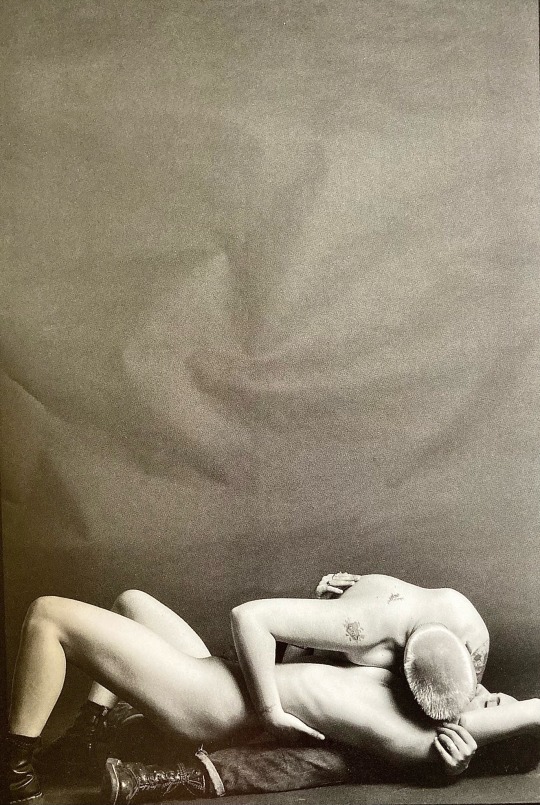
"Untitled" by Phyllis Christopher, 1988
source: Nothing But the Girl: The Blatant Lesbian Image, edited by Susie Bright & Jill Posener
4K notes
·
View notes
Text
"Today, I am wearing my hair long and permed into full curls around my face, tying it up in sheer, silken scarves. I often choose to be late for a date rather than go out feeling "unfinished," which some days means a little powder and Chap Stick and other days means a total makeover. I wear long silk shirts and fluffy sweaters when I want, and regard the word pretty as a compliment again. Still, I know I am regarded as a failure and even a traitor by many in this [lesbian] club because I suffer occasional self-recrimination for being a size sixteen instead of a size six, because I enjoy wearing miniskirts and stockings, because I apparently care about and conform to the opinions of the "wrong" people (people in that other world who label us unacceptable or unfit). They say I am selling out, catering to patriarchy, being codependent on my mother and her opinions. Choose your descriptors, choose your chains. Too often, the saleswomen of the so-called freedom are more like the neo-conservatives and fundamentalists of the world, who say, "Do it our way or don't expect any privileges." They are not selling us the right to be who we want to be, they are selling us the right to be what they believe we should want to be. Sometimes, those rights are the same thing. More often, they are not. And when they are not, worlds may collide in a firestorm of indignation, embarrassment, and rage. I want that freedom they sold me. I want the freedom to love women, passionately and overwhelmingly. I want the freedom to love them the way I want, whether I wear a lace dress or jeans, whether I wear press-on nails or no lipstick. I want the freedom to feel sexy at 170 pounds. I want to do aerobics without resorting to stealth maneuvers. And I want the freedom to be who I am, without embarrassment or fear. I want no exceptions, no contingencies, no caveats. And if our community cannot--or will not--grant that freedom, I, and those like me, the rebel-conformists if you will, will take it. We will even steal it if we must. They'll be surprised at how fast we can run in those tight skirts and pumps."
- An excerpt from "Supercolliding over a Twinkie: Angry Musings from a Femme in the Deep South," an essay written by Constance Lynne and found in The Femme Mystique. (Emphasis in bold my own.)
306 notes
·
View notes